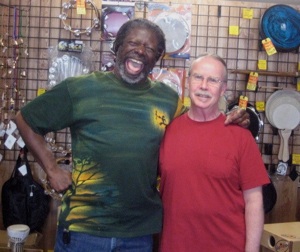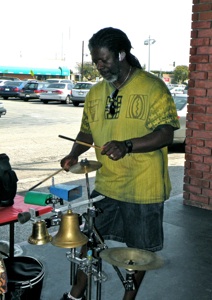Michael McCarty’s Story

Michael McCarty - From Black Panther to Griot
Michael McCarty’s road to becoming a world renown storyteller began in the mean streets of Chicago in the 1950’s and he has traveled around the world as a professional storyteller since the mid 1990s. He’s the Director of The Griot Workshop in Los Angeles and member of the National Storytelling Network, sponsor of the 2010 National Storytelling Conference in Woodland Hills. Michael won the Leadership and Service Award from the National Storytelling Network in 2003 and the Spirit of Storytelling Award from the L.A. Storytelling Festival in 2008. He was also honored with a fellowship from the Just Stories Festival near Chicago and commissioned to create a story about his own life. Michael was awarded the Candlelight Award for Sharing Hope in South Africa in 1998. This interview was conducted at Michael’s L.A. area home in April 2010.
Sharon - You grew up in Chicago. How did your childhood in a pretty rough neighborhood effect your political and social views?
Michael - I was born in 1950 and I grew up on the west side of Chicago. I grew up in what was termed “the ghetto,” although like most of the families in my neighborhood my family had both parents. In most families one parent was working. In my case, my father was working at International Harvester. My mother was a stay at home mom, although she did clean houses at Evanston and Skokie. I went to Catholic school from elementary school through high school. However, I got kicked out of high school, which I’ll talk about later.
Yes, I grew up in a rough neighborhood. I can remember going to the theater and when I went to the washroom the thugs were there. It would cost a dime or a quarter to use the restroom. I got jumped on by some gangs and had things like that happen. But, that was the norm.
One more unusual incident happened when I was in the Boy Scouts. Three of my friends and I were trying to get our cycling Merit Badges. You had to ride 50 miles. So we determined we needed to ride out from our neighborhood around Fourteenth and Polaski to Crestwood, Illinois.
We set out on a Saturday morning and we rode out to, and maybe a little past Crestwood, Illinois and then we turned around to come back. On our way back there was a water fountain across the street from a ball park where there was a Little League game going on. One by one we stopped at the water fountain, and I was the last one.
I was trying to drink all the water in the universe. Then I became aware that my friends were yelling and screaming and pointing. So I turned around and the Little league game had stopped. The field and the stands had emptied and all the parents and people were running after us. Actually, after me, because I was the closest. They had bricks and baseball bats. They were cussing and screaming. I still have this image of a little white lady, about 5 feet tall with glasses on, yelling at me with something in her hand. She was calling me “nigger.”
I took off. And I quickly caught up with my friends and we rode our bikes for many blocks until we were safe. We laughed about it and rode home. I don’t know about my friends, but I never told my parents about it. That’s because that’s the way things were.
Sharon - Were those people after you because you drank out of their water fountain?
Michael - Yes. This was an all white community. Within 20 or 30 blocks of our neighborhood we were outside of the black and Latino community. The farther we bicycled the whiter the neighborhood got. So where we were around Crestwood, Illinois, that was lily white at the time. There were neighborhoods in Chicago where if you were black you knew you shouldn’t be there after dark. If you had a job in the area you went to your job, got on the bus or in your car and you left the area.
Just a mile or so from where I grew up was Cicero, which was a particularly racist community. It’s one of the communities where when Martin Luther King came, he almost got taken out there. Blacks were routinely beaten and killed in that area. That was the neighborhood.
Sharon - Was this experience the first time you encountered this type of violent racial attitude?
Michael - That was the most violent thing I had personally encountered. I had another incident where a buddy and I had ventured toward Cicero on our bikes and one of us needed air in a tire so we stopped at a gas station. As we were putting air in the tires, suddenly water appeared. One of the station attendants got a hose and was laughing with his friends at hosing us with the water. We just got on our bikes and left. The incident near the ball park was the most life endangering experience I had up until that point.
Sharon - Did you ever tell your parents about it?
Michael - No, I never did. I told my sister and my brother about it several years ago. One day I told me sister a bunch of things I had done that she didn’t know about. She said, “Oh, my God!”
Thursday, June 3, 2010

Michael and brother Grover in 1970s or early 80s
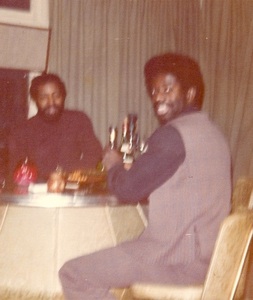
Sharon - At what point did you get involved in the Black Panthers?
Michael - It was in high school. I went to Saint Ignatius, a very prestigious college prep high school in Chicago. It was over 95 percent white, even though it was in a black community. I was going to be a physicist. That was my dream. I was going to be the first one in my family to go to college.
I had been aware of civil rights because I was a reader. My mother got four daily papers, so I was always reading. Another incident happened when I was in my sophomore year in high school. A buddy and I went to the south side of Chicago, a black community, for a party. We went into a high rise building, walking past some guys and turned the corner where we thought the elevator was. It was a dead end. We turned around, and by then the guys got some friends. It was a gang. They proceeded to beat the snot out of us. The group that was stomping and beating me kicked me out into the street. They beat me until they got tired.
I was laying on the ground and a guy put a gun to my head and just as he pulled the trigger a girl grabbed his hand. So he pistol whipped me, and then he told me to run. I couldn’t even stand up so I crawled to the next street, which was South Park Boulevard, now called King Drive. My friend was still in the building.
There was a police car stopped at a light. I was bleeding and starting to swell up. I staggered over to the police car and frantically told the cop that a gang jumped us and my friend was still back there and they may kill him! He looked at me and said, “So?” Now this ain’t the way it was supposed to happen. So I got in the back seat of his car because he was supposed to help me. I begged him to help my friend.
He drove me to the building and pulled up in front of it. He told me to get out of the car and go inside by myself and find my friend. Meanwhile, the gang was out there and they saw me. They started coming toward the police car and I said, “Arrest me. Take me to the police station. Get me out of here!” So he drove to the police station and dropped me off.
I walked into the police station and never got a chance to tell them what happened. By now I was really swelling up, bleeding and crying. And all the cops, who were white, started laughing. They didn’t do anything. So I went to the phone to call my parents. My father came to get me. My friend had gotten into somebody's apartment who let him call his mother. She went to get him and we met up at the police station. Then they took us to the hospital. That was my wake up call in terms of police.
That’s when I became active. I first got involved in the youth wing of the NAACP on the west side of Chicago. I’m a reader and I saw all the things coming out about black history and culture. Books by Larone Bennett, John Hope Franklin and others. So I got books, newspapers, magazines and whatever I could get my hands on. Ramparts Magazine was a magazine that dealt with the Left and Progressive cause and that’s probably where I first heard about the Black Panther Party.
Eldridge Cleaver wrote for Ramparts for a time. There was the incident where Bobby Seal and a group of Panthers went to the state legislature to protest a law that would not allow them to carry guns any more. It got the nation’s attention. It was happening at a time when civil rights workers were being beaten and hosed and had dogs set on them. Some were tortured and killed.
Here was a group that was not just standing up against racism, but was standing up to the racist police. That caught the imagination of young blacks at the time. Imagine watching churchgoing women and men being abused and brutalized and the government just said, “Oh, that’s really a shame.” The Black Panther party showed many of us that there was another approach to take.
I was on a track team in high school in 1968, the year when Tommy Smith and John Carlos did their Black Salute at the Olympics when they won the 400 Meters. There was this rising desire to do something. My mother always told me we had an obligation to do something when you saw something wrong or an injustice.
In November 1968, the Illinois Chapter of the Black Panther Party opened on the west side of Chicago off Madison and Western. So, I went there to find out about it and to join. A friend of mine from track was the Deputy Administrator of Education. That group was responsible for teaching the political education classes. If you joined the party, you had to attend political education classes, there were books you had to read and we had discussions about them. One of my first jobs was to read the books and teach the political education classes.
The following year in 1969 was when the Breakfast With Children programs were started, because kids in poor communities were going to school hungry. We also had to sell papers that helped spread the philosophy of the Party. That was how full-time Party members earned money.
When I joined the Black Panther Party I was still in school. In February 1969 our black student organization presented a list of demands to the school, including Black Studies, community outreach, and more blacks and minorities in the school. They rejected it so we organized a walkout. There were about 30 to 40 black students and some white students who also supported our demands.
My mother saw the student walkout on the news that night and she knew there would be consequences. I was the vice president of the black student organization and my buddy was the president, and we were both kicked out of school. That’s when I became a full time member of the Black Panther Party.
At that point it was my senior year of high school. I had scholarships to Notre Dame, the University of Illinois and several other places. I had planned to be a physicist, but I took a little detour and became a member of the Black Panther Party. Fred Hampton was the chairman of the Illinois Chapter of the Party. He was a dynamic speaker and motivator. It was from Fred and my experience in the Party that I learned the meaning of commitment.
Sharon - Did you ever go back to school?
Michael - I went back to school a couple of years later after I left the Black Panther Party. On December 4, 1969 Fred Hampton was assassinated. The Chicago police, in conjunction with the FBI conducted a raid at Fred’s apartment around 4 o'clock in the morning. I left that apartment at 2 a.m. We had a big rally the night before at the People’s Church and a lot of us went to Fred’s apartment afterwards.
I fell asleep there, woke up around 2 a.m. and I decided to go to my parents home. I had hardly laid down at home when I got the word about the raid and that Fred had been killed. If they had not put two bullets in Fred’s head while he was unconscious he would have died anyway. He was unconscious because he had been poisoned.
Our head of security, William O’Neil, was an FBI agent. He had given Fred six times the lethal dose of Seconol. So he would have died anyway. After the raid there was a lot of furor in the community because Edward Hannerhan, who had been the organizer of the raid, claimed it was a shootout and the officers barely escaped with their lives.
The truth is, there was only one shot fired from inside the apartment, by Mark Clark. It happened after he was shot and killed. His gun discharged when he fell to the ground. More than 100 shots were fired from the police. Hannerhan, during a press conference ws showing bullet holes that were actually nail holes. This information came out later.
Sharon - It’s a good thing you weren’t still at the apartment.
Michael - That was one of the many, many lucky experiences in my life. In January 1970 my wife, who was also a Black Panther Party member, got pregnant. In the spring or early summer, we left the party. Fred was the heart and soul of the party. He was the glue that held everything and everyone together. There were many divergent personalities and it didn’t work as well after he was gone.
I took a job at the U.S. Post Office with the intention of getting settled and going back to school. In December, 1970 I was working at my station at the main post office in Chicago when my supervisor came to me and said, “Mac, some government agents want to speak with you on the 9th floor.” Basically, they wanted me to rejoin the Party and become an informant.
I refused. They said, “You work for us, or you won’t work.” A few months later, I got a document in the mail that was all about me. It was about me getting kicked out of high school after leading the walkout. The government was claiming that I was in an organization that advocates the armed overthrow of the government. They threatened to prosecute me. They demanded to know how many guns I owned and how many rounds of ammunition.
They had transcripts of conversations I had with people in bookstores. Years later, after my wife and I were divorced, we each saw our FBI files. So, I left my job at the post office. I applied for other jobs, but the applications would mysteriously disappear. I enrolled in the University of Illinois at Chicago and the FBI was still hounding me. Over a two year span, I had three different apartments broken into 8 times. This went on and on. It also caused a lot friction between my wife and I, and we eventually split up.
My life was a wreck. The day before Thanksgiving, 1972 I was a nervous wreck and had dropped out of school. I was driving a cab and I remember coming home and seeing the 8th break-in. I was through. The FBI was trying to destroy me. They had infinite resources and I didn’t. So, I decided to make it easy for them to watch me. I joined the Army.
I was stationed at Fort Polk, Louisiana for basic training and Advanced Individual Training. (AIT) During my AIT, one of the permanent duty guys said, “Mac, government people have been coming around here asking questions about you.” I knew that would happen. The next day my First Sergeant in the AIT unit said, “Mac, these government people want to talk to you.”
So I told them I had seen the error of my ways and that I was here to serve my country. I finally got them off my back. I went on to have a great time in the Army. I studied martial arts and was introduced to Oriental medicine.
Sharon - How did being in the Army change you?
Michael - The Army was a crucial time for me. Studying martial arts was very empowering for me. I got into the whole “I’m OK, You’re OK” philosophy. I stopped trying to blend in and accepted that I was wild and crazy and that’s the way I am. A Korean friend at the base gave me an acupuncture treatment when I sprained my wrist, and I later became an acupuncturist myself. I started reading eastern philosophy when I was in the Army, and that broadened my consciousness and awareness.
Sharon - When did you leave Chicago?
Michael - I left Chicago for good in 1985. I had gone to India in 1982 and ‘83 to visit my Indian spiritual teacher, Sai Baba. In 1985 there was a world conference in India and it was Baba’s 60th birthday. I was broke at the time. I got a letter from someone in Los Angeles saying, “Don’t worry about money. Make the arrangements and the money will come.”
I came to L.A. and then spent three months in India and a month in Taiwan. When I got back to L.A. I had $18 and no return ticket to Chicago. I’ve been here ever since. When I got to L.A. I stayed with a friend I had known in Chicago. I stayed with her for about a month. Then, things started coming together. I got a car for a dollar. I got a job. I found a place to stay. And things started falling together.
I became an acupuncturist in 1981 and I was trying to get my license in California. Every time I tried to get my license it was like a Himalayan mountain range fell in my path. In 1992 I was introduced to Joel ben Izzy, a professional storyteller. I was amazed to hear that there were people who made a living telling stories. I picked his brain and I decided to be a storyteller. My motto is “Have Mouth, Will Run It.” A week later I asked myself what would I do for a profession if I were wealthy, and I said to myself I would tell stories.
I went to my local library in Echo Park and I started reading books about storytelling and collections of folk tales. A young adult librarian asked me why I was reading all these books. When I told him I was a storyteller he said he knew some teenagers who wanted to learn storytelling. So, I gave a workshop and it was a great success. That’s how I became a resource for the L.A. Library. I’ve been running my mouth around the country and the world ever since.
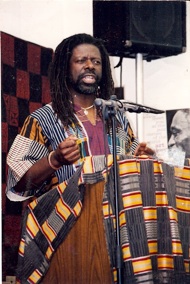
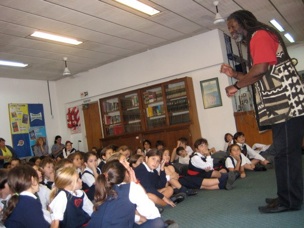
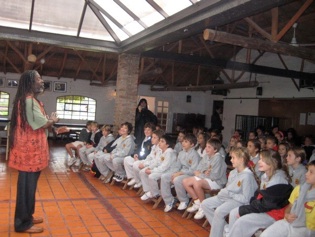
Michael performing in Uruguay and in Buenos Aires
Sharon - Storytellers have been around for centuries. So why does this seem like a novel idea in this age of computers and sound bites?
Michael - The more technological we become, the more storytelling is growing. I think humans are hard-wired for storytelling. It’s in our DNA. We need that personal interaction. When I go to storytelling events I see this yearning in people. I remember when a group called The Moth first started in 2006 in Los Feliz I would watch people as they came in the door. They were in their 20s and 30s and they wanted to hear some stories.
There’s a quote from Barry Lopez that basically says, “We need stories more than we need food.” It’s an intimate part of us. It’s that human interaction and sharing of experience. At meetings like Alcoholics Anonymous, people share their stories. When someone has gone through a drug or alcoholic experience, they believe no one else could possibly have done the same stupid things they did.
I addressed a drug abuse facility in South Africa in 1998. I went through my own experience with drugs years ago, and I shared my own experience with drugs. I did it with intensity and with humor. Afterwards, some guys came up to me and said, “Man, knowing that folks in America go through the same kind of stuff we go through here in South Africa and you got out of it means we can get out of it.” Sharing stories give us hope, make us laugh and connect us.
Sharon - What’s the most important element of a good story?
Michael - In my storytelling workshops I tell people that the most important thing about selecting a story is that you tell a story that you love. Tell a story that means something to you. When you share that story, you’re sharing some of you. People will connect with that. If you share a story about growing up, that strikes a cord with others.
I do a story about my daughter, and when I do that story parents with kids relate. They’ve been there. Kids also relate because they’ve been that kid in the story. It’s an opening of your heart.
Sharon - Can you also tell a story about someone else’s life?
Michael - There are historical stories, folk tales, stories about travel and experiences, and stories about the brilliant or stupid things I’ve done. I did a program at the Annenberg Community Beach House recently and I shared personal stories, a folk tale and a historical story. Storytelling is a human phenomenon. In this country it has been presented as something primarily for kids, but traditionally it was for adults. Children could come if they were quiet and paid attention. I love telling stories to adults because they don’t know what to make of it at first. Then they lean forward and go into what we call “story trance.” It’s great.
Sharon - What makes some folk tales and fables endure for centuries?
Michael - It’s because they strike a common chord. Aesop’s fables were stories that were told using animals and scenarios to deal with things that were happening in the kingdom. You couldn’t tell the king. “You’re screwing up,” but you could tell a story about someone else screwing up and hope he got the message. There’s a universality about folk tales. Stories show us what we have in common and they show us how we’re different. The commonality is the chord that resonates.
Sharon - Tell us how you use music and sound effects to enhance your stories.
Michael - It’s rather organic with me. I do a story called “The Strange Creature” and drumming is involved in the story. There’s a well known local Nigerian drummer, Ayo, who asked me if I wanted him to drum during the story. I said “yes,” but when it came to the drumming part of the story I realized that I need the drumming to be at a certain pace so I need to do the drumming myself. So, that’s when I started using my own drum in the story. Other storytellers who have musical skills bring those skills to their stories.
